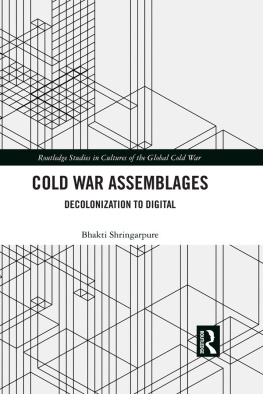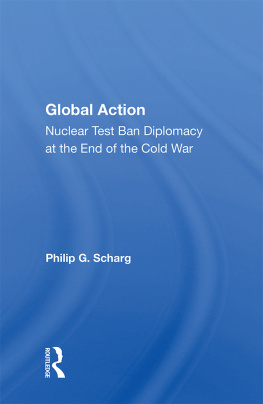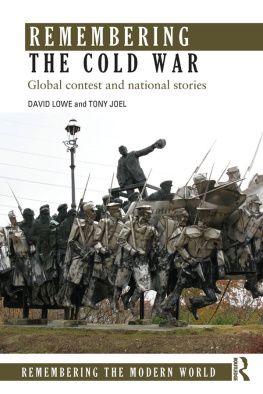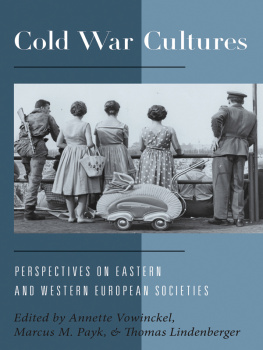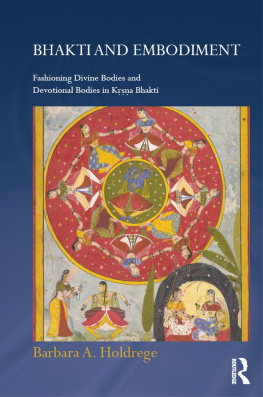Bhakti Shringarpure - Cold War Assemblages (Routledge Studies in Cultures of the Global Cold War)
Here you can read online Bhakti Shringarpure - Cold War Assemblages (Routledge Studies in Cultures of the Global Cold War) full text of the book (entire story) in english for free. Download pdf and epub, get meaning, cover and reviews about this ebook. year: 2019, publisher: Taylor and Francis, genre: Politics. Description of the work, (preface) as well as reviews are available. Best literature library LitArk.com created for fans of good reading and offers a wide selection of genres:
Romance novel
Science fiction
Adventure
Detective
Science
History
Home and family
Prose
Art
Politics
Computer
Non-fiction
Religion
Business
Children
Humor
Choose a favorite category and find really read worthwhile books. Enjoy immersion in the world of imagination, feel the emotions of the characters or learn something new for yourself, make an fascinating discovery.
- Book:Cold War Assemblages (Routledge Studies in Cultures of the Global Cold War)
- Author:
- Publisher:Taylor and Francis
- Genre:
- Year:2019
- Rating:3 / 5
- Favourites:Add to favourites
- Your mark:
- 60
- 1
- 2
- 3
- 4
- 5
Cold War Assemblages (Routledge Studies in Cultures of the Global Cold War): summary, description and annotation
We offer to read an annotation, description, summary or preface (depends on what the author of the book "Cold War Assemblages (Routledge Studies in Cultures of the Global Cold War)" wrote himself). If you haven't found the necessary information about the book — write in the comments, we will try to find it.
Cold War Assemblages (Routledge Studies in Cultures of the Global Cold War) — read online for free the complete book (whole text) full work
Below is the text of the book, divided by pages. System saving the place of the last page read, allows you to conveniently read the book "Cold War Assemblages (Routledge Studies in Cultures of the Global Cold War)" online for free, without having to search again every time where you left off. Put a bookmark, and you can go to the page where you finished reading at any time.
Font size:
Interval:
Bookmark:
Shringarpure goes beneath the skin of postcolonialism and finds the Cold War. Here is the brutality of colonial violencethe harsh use of the stick, surely, but also the enforcement of starvation. Her book slips through the minds of major thinkers of decolonization, finding so much about them that has been set aside by the narrower concerns of North Atlantic postcolonial studies. This is criticism with a foot deeply sunk into the mud of the South.
Vijay Prashad, Tricontinental: Institute for Social Research
This is an important rethinking of postcolonial studies today. Shringarpures provocative book underscores the urgency of bringing together studies of colonialism with studies of the Cold War, and offers a compelling methodology for doing this work. Clearly written and bold, Cold War Assemblages questions widely touted figures and approaches from Gandhi to close reading and openness in the digital realm, and offers in the place of depoliticized reading and teaching strategies a red thread that ties together the US-American university landscape and culture industry with the historical and ongoing impacts of colonialism and Cold War violence in the Global South.
Kerry Bystrom, Associate Professor of English and Human Rights and Associate Dean of the College atBard College Berlin, A Liberal Arts University
Bhakti Shringarpures book is a necessary intervention in the intellectual history of the Cold War and the postcolony. In showing that these histories cannot be separated, Shringarpure also shows how both are embedded in futures to come. Anyone interested in political violence, revolutionary time, radicalism and political theory must reckon with Shringarpures analysis.
Sean Jacobs, The New School and Africa Is a Country
This book bridges the gap between the simultaneously unfolding histories of postcoloniality and the 45-year ideological and geopolitical rivalry between the US and the USSR. Not only did the superpowers rely upon the decolonizing world to further imperial agendas, but the postcolony itself was shaped, epistemologically and materially, by Cold War discourses, policies, narratives, and paradigms. Ruptures and appropriated trajectories in the postcolonial world can be attributed to the ways in which the Cold War became the afterlife of European colonialism. Through a speculative assemblage, this book connects the dots, deftly taking the reader from Frantz Fanon to Aaron Swartz, and from assassinations in the Third World to American multiculturalism. Whether the Cold War subverted the dream of decolonization or created a compromised cultural sphere, this book makes those rich palimpsests visible.
Bhakti Shringarpure is Assistant Professor of English at the University of Connecticut and editor-in-chief of Warscapes magazine.
Series Editors:
Monica Popescu
(McGill University)
Katherine Zien
(McGill University)
Sandeep Banerjee
(McGill University)
Routledge Studies in Cultures of the Global Cold War aims to invigorate research on the Cold War beyond the US-USSR bipolar framework, to focus on what is now called the Global SouthAfrica, Asia, Latin America and the Caribbean. These sites have both been impacted by, and have transformed in turn, the global engagement of the Cold War and its cultural and political discourses. Moreover, the series focuses on cultural production in these regions to understand how ideological battles intertwined with direct violence in the Cold Wars hot zones. The series invites monographs and edited collections that historicize and trace genealogies of the conceptual tools and methodologies informing current debates stemming from the Cold War period.
Cold War Assemblages
Decolonization to Digital
Bhakti Shringarpure
For more information about this series, please visit: www.routledge.com/Routledge-Studies-in-Cultures-of-the-Global-Cold-War/book-series/RSCGCW
Decolonization to Digital
Bhakti Shringarpure

First published 2019
by Routledge
52 Vanderbilt Avenue, New York, NY 10017
and by Routledge
2 Park Square, Milton Park, Abingdon, Oxon, OX14 4RN
Routledge is an imprint of the Taylor & Francis Group, an informa business
2019 Taylor & Francis
The right of Bhakti Shringarpure to be identified as author of this work has been asserted in accordance with sections 77 and 78 of the Copyright, Designs and Patents Act 1988.
All rights reserved. No part of this book may be reprinted or reproduced or utilised in any form or by any electronic, mechanical, or other means, now known or hereafter invented, including photocopying and recording, or in any information storage or retrieval system, without permission in writing from the publishers.
Trademark notice: Product or corporate names may be trademarks or registered trademarks, and are used only for identification and explanation without intent to infringe.
Library of Congress Cataloging-in-Publication Data
Names: Shringarpure, Bhakti, author.
Title: Cold War assemblages : decolonization to digital / by
Bhakti Shringarpure.
Other titles: Decolonization to digital
Description: First edition. | New York : Routledge, [2019] | Series:
Routledge studies in cultures of the global Cold War | Includes
bibliographical references and index.
Identifiers: LCCN 2019010504 (print) | LCCN 2019010841
(ebook) | ISBN 9780429242649 | ISBN 9780367196943
Subjects: LCSH: Cold WarPolitical aspects. | Postcolonialism. |
Decolonization. | Civilization, WesternHistoriography. |
Intellectual life.
Classification: LCC D843 (ebook) | LCC D843 .S494 2019
(print) | DDC 909.82/5dc23
LC record available at https://lccn.loc.gov/2019010504
ISBN: 978-0-367-19694-3 (hbk)
ISBN: 978-0-429-24264-9 (ebk)
Typeset in Sabon
by Apex CoVantage, LLC
History does not unfold in a straight line with predictable results.
Ngg wa Thiongo, Birth of a Dream Weaver
Routledge Studies in Cultures of the Global Cold War aims to invigorate research on the Cold War beyond the US-USSR bipolar framework, to focus on what is now called the Global SouthAfrica, Asia, Latin America and the Caribbean. These sites have both been impacted by, and have transformed in turn, the global engagement of the Cold War and its cultural and political discourses. Moreover, the series focuses on cultural production in these regions to understand how ideological battles intertwined with direct violence in the Cold Wars hot zones. The monographs and edited collections in this series historicize and trace genealogies of the conceptual tools and methodologies informing current debates stemming from the Cold War period.
The first book in the series, Bhakti Shringarpures Cold War Assemblages: Decolonization to Digital is a brilliant methodological intervention that cuts across disciplines to explore the entanglements of the global Cold War with processes of decolonization and their aftermath. Shringarpure identifies key Cold War moments and epistemes that have shaped our understanding of cultural production: the methodological bifurcation in the works of Gandhi and Fanon which set up different models for postcolonial theory; the assassination of revolutionary leaders and thinkers Patrice Lumumba, Amilcar Cabral, Thomas Sankara and the subsequent transformation of nation time in the postcolony; and the impact of the USAs covert patronage of cultural activities and the establishment of a Cold War paradigm in literary and publishing culture, a paradigm whose premises are still visible today in the digital realm. The books assemblages approach and radical interdisciplinarity deliver a pathbreaking interrogation of postcolonial studies as a field.
Font size:
Interval:
Bookmark:
Similar books «Cold War Assemblages (Routledge Studies in Cultures of the Global Cold War)»
Look at similar books to Cold War Assemblages (Routledge Studies in Cultures of the Global Cold War). We have selected literature similar in name and meaning in the hope of providing readers with more options to find new, interesting, not yet read works.
Discussion, reviews of the book Cold War Assemblages (Routledge Studies in Cultures of the Global Cold War) and just readers' own opinions. Leave your comments, write what you think about the work, its meaning or the main characters. Specify what exactly you liked and what you didn't like, and why you think so.

